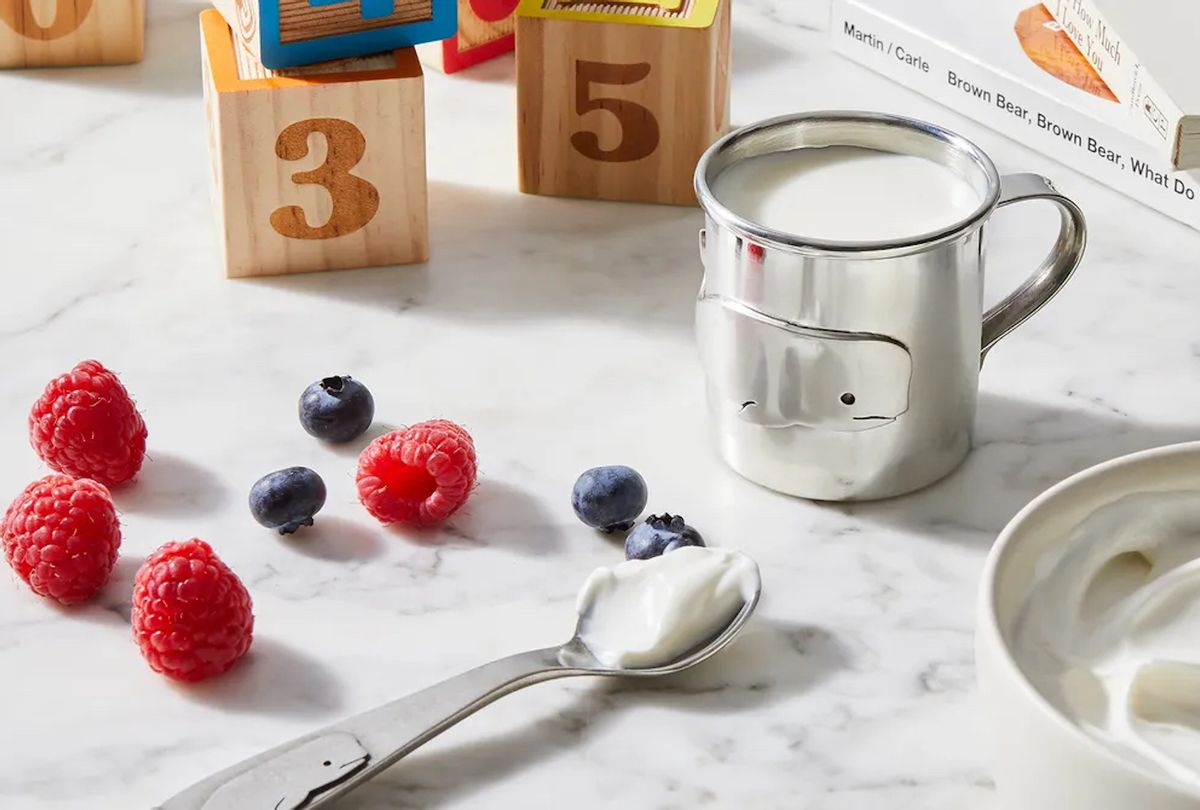You're pregnant, congrats! What a wild, joyful, cosmic, overwhelming, incredible, uncertain, life-altering experience pregnancy and motherhood can be. When you're pregnant, there's enough to think about without wondering about what's safe to eat, yet here we are.
Fact is, whether you're pregnant or not, essentially all food can pose some kind of risk, from E. coli–tainted leafy greens to accidentally undercooked meat. With this in mind, it's best to take a balanced approach to risk and benefit when choosing ingredients for pregnancy-safe recipes — maximizing taste, nutrition, and variety.
As the founder of a platform for research-backed, pregnancy-friendly recipes, I know I'm not the only one seeking out an approachable and informative database of delicious — and safe! — recipes for the modern mama-to-be.
Still, it's especially important to note that cultures around the world differ on what's taboo for pregnant bodies, with little agreement over definitive outcomes — it's always best to consult your personal doctor, midwife, or nutritionist with health questions about what's right for you during your pregnancy and postpartum journey.
Alcohol
Since alcohol may cause birth defects and doesn't supply any nutritional value, most every professional agrees that alcohol should be avoided during pregnancy. The good news? You'll have nine months to discover flavor-packed mocktails and nonalcoholic spirits, and they're only getting more exciting these days.
Caffeine
During pregnancy, your recommended daily water intake is higher than usual to maintain healthy amniotic fluid, support an increase in maternal blood volume, and combat constipation. While it's important to keep in mind that caffeine is a diuretic, luckily you don't have to cut it out completely during a pregnancy; it is suggested to limit your intake to 200 milligrams. For reference, an 8-ounce cup of coffee contains 80 to 100 milligrams of caffeine, an 8-ounce cup of green or black tea has 30 to 50 milligrams, an 8-ounce cup of an energy drink can range from 40 to 250 milligrams, and a 12-ounce can of a caffeinated soft drink typically contains 30 to 40 milligrams.
Meat
Raw or undercooked meat should be avoided to reduce your risk of potential contamination with coliform bacteria, toxoplasmosis, and salmonella. Easy solution: Invest in a meat thermometer and cook everything to the proper internal temperature — 145°F with a 3-minute rest time for beef, pork, veal, and lamb (roasts, steaks, chops, etc.); 160°F for ground meat such as ground beef, ground pork, ground veal, and ground lamb; and 165°F for all poultry.
Deli meat (think: sliced turkey, salami, hot dogs, bologna, and prosciutto, to name a few) may contain listeria, which, among a number of health complications, can cause miscarriage. You have options here: Zap the deli meat into oblivion in the microwave until it's steaming, or if sweaty charcuterie isn't your thing, simply opt to avoid deli meats completely during pregnancy.
Fish
Fish is a fantastic source of protein, omega-3 fatty acids, and iodine for both you and your growing baby. However, there are some suggested parameters:
It's a good rule of thumb to forgo freshly caught fish in local waters, and rather opt for fish sold by a trusted seafood vendor. Per the FDA, "Some fish caught by family and friends, such as larger carp, catfish, trout, and perch, are more likely to have fish advisories due to mercury or other contaminants. State advisories will tell you how often you can safely eat those fish."
Smoked fish that requires refrigeration, such as lox, nova-style, kippered, or jerky, is considered precarious for those who are pregnant because, like deli meat, it could be contaminated with listeria. However, shelf-stable, tinned smoked fish, such as sardines or Pacific mackerel, is actually considered safe.
Raw shellfish can pose a higher risk of consuming harmful bacteria, parasites, and toxins, so it's best to save the oyster shooters for post-baby.
It's recommended to consume two to three servings per week of low-mercury seafood like anchovies, cod, halibut, salmon, scallops, shrimp, snapper, tilapia, and American Pregnancy Association–approved Safe Catch canned tuna. This recommendation applies to when you're pregnant or breastfeeding — depending on how frequently you normally consume fish, this may mean increasing or limiting your intake to two to three servings per week. An optimal serving size is 4 ounces, so aiming for a total of 8 to 12 ounces per week is the ideal sweet spot.
It's common to crave sushi and sashimi during pregnancy. According to the American Pregnancy Association, "doctors don't know exactly why women crave certain tastes, textures or flavor combinations…Most cravings are the body's attempt to obtain vitamins or minerals that are missing through normal food consumption. It may be changing hormones or the extra work your body does to sustain your baby." Listen to your bodily intuitions — as long as you are enjoying low-mercury, wild-caught, previously flash-frozen raw fish from a reputable Japanese sushi restaurant, you're in the clear.
Fruits and Vegetables
Get in the habit of thoroughly rinsing all your fruits and vegetables in cool tap water, including the outer rinds on whole melons and citrus, as well as the peels on carrots and tougher skins on potatoes, to eliminate any unwanted potential dirt, germs, and toxins. Steer clear of sprouts, since they are too delicate to clean completely.
Juice is an excellent, nutrient-dense drink choice — just make sure you opt for pasteurized versus raw. Hot tip: If you are juicing at home, bring your juices to a rolling boil for 1 minute to kill off any potential bacteria. Allow to cool, then drink up. Feel free to throw in a few ice cubes to accelerate the cooling process. Kindly note that putting hot or warm items directly into the fridge or freezer is not good from a food safety standpoint, as it raises the internal temperature of the hardworking machine and all the items inside of it (bacteria loves to grow in a warm environment). Keep this in mind when batch-cooking soups, too, and always allow your liquids to cool before placing them in the fridge or freezer!
Dairy
Avoid raw milk with its potential pathogens; drink pasteurized milk instead.
Plain pasteurized Greek yogurt is a smart choice for pregnant women. Since it is strained, most of the lactose (the form of carbohydrate in dairy) is removed, and the protein is concentrated. Greek yogurt does not raise your blood sugar level and is therefore gestational-diabetes-friendly. Most yogurt is not strained (unless it's Greek!), so there is additional lactose that can spike blood sugar. Other yogurts often have sneaky sugars, via the naturally occurring sugar in fruit jam, or the addition of refined sugar to many yogurt products. Make sure you read your yogurt labels and look for minimal to no added sugar.
Cheese has some suggested boundaries during pregnancy. Soft unpasteurized cheeses are considered unsafe for two reasons: They are produced with raw milk, and they have a high moisture content (harmful bacterias love a wet environment). Still, if you are hankering for soft cheese, pasteurized cottage cheese, queso fresco, fresh chèvre, mozzarella, ricotta, feta, Brie, Camembert, and blue cheese are all considered safe. Otherwise, hard, dry, aged cheeses such as Parmigiano-Reggiano, English cheddar, and Gruyère are totally in the clear.
Eggs
Eggs are absolutely amazing (whether you're pregnant or not!) — they are loaded with vitamins and nutrients, they pack a protein punch, plus they may relieve heartburn and even boost energy. If and when possible, Certified Humane, Certified Organic, and pasture-raised (or free-range) eggs are best. Here's the thing: Both raw eggs and pasteurized eggs can carry salmonella. Cooking eggs simply reduces your exposure to salmonella; this same conundrum exists if you are pregnant or not. So if you source high-quality eggs, chances are you'll be fine to eat the runny yolk.
* * *
Just because you're pregnant doesn't mean you have to give up all your favorite foods. Knowing the reasons why certain foods "should" be avoided will give you peace of mind and allow you to weigh your own personal risk factors when choosing what to consume. And don't forget to be kind to yourself: Simultaneously nourishing your changing body and your growing baby is a lot of work and decision making. And in case you need to hear this today: You're doing a great job, Mama!




Shares